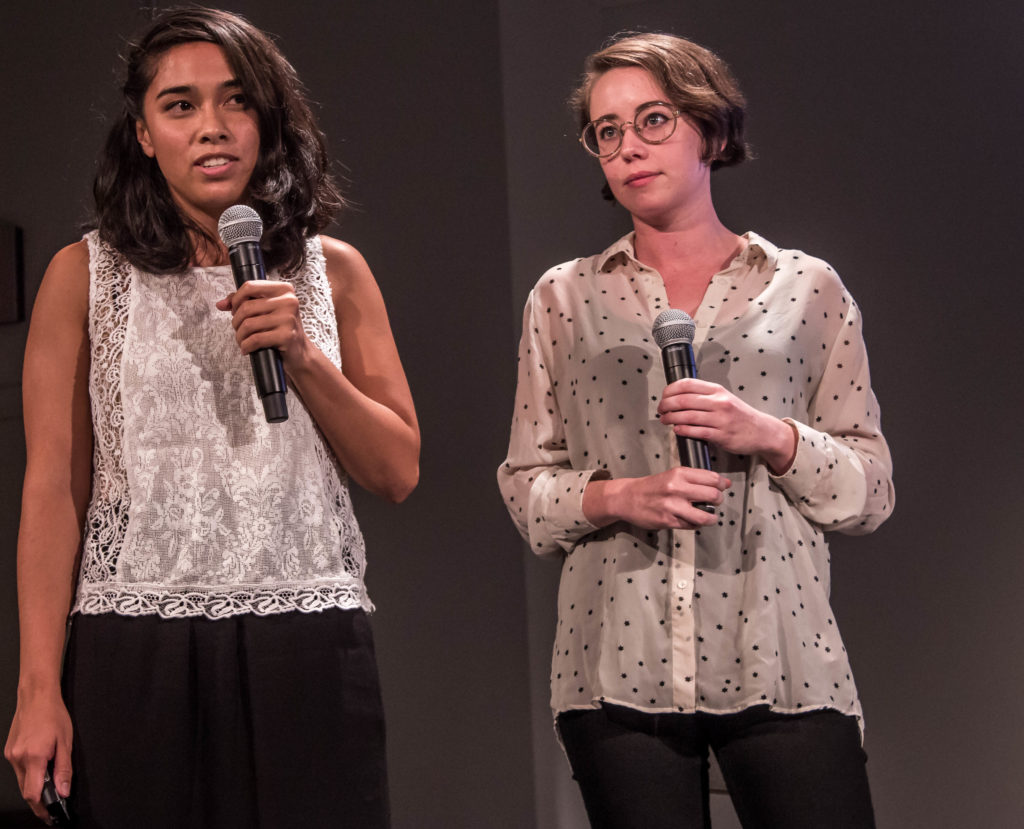“Brooklyn has the highest number of female entrepreneurs in the country,” Regina Myer, president of the Downtown Brooklyn Partnership, declared this week from a stage at City Point. The occasion: a new episode in the partnership’s Make It in Brooklyn series of pitch contests, this one focusing on female founders. From a pool of 70 applicants, the partnership chose five female startup founders to pitch their business plans to a panel of judges.
The contestants were vying for a three-part prize consisting of a $5,000 check, $15,000 in design-and-branding services from the firm Berlin Cameron, and tickets to The Other Festival, a celebration of women entrepreneurs taking place this weekend at City Point. Each entrepreneur or team took five to ten minutes to make their pitch, followed by questions from the five female judges. After ten minutes of deliberation, the judges rendered their decision. (We’ll reveal the winner at the end of the story.) The pitches:
Teniola Adejuwon, founder of Miah Beauty
BunkUp: an app to search for roommates
Up first was Margarite Halaris, whose app, BunkUp, is setting out to “reinvent the way you find roommates.” The app provides users with a list of potential roommates and can also connect users with a real-estate agent to help find a suitable apartment. Whether the user is looking to sign a long-term lease or just a sublet for a couple of months, BunkUp takes these factors into consideration and will provide users with an array of housing options. After listening to the pitch, the judges asked Halaris about the app’s vetting process. Halaris said the app requires users to sign in via Facebook, which helps confirm identity and means that those using the app will be able to see if they have friends in common. BunkUp “encourages users to live with other users that they share mutual friends with,” she said.
Miah Beauty: membership-based cosmetics
“Why do you wear makeup?” That was the question posed by the first slide of Teniola Adejuwon’s presentation. Of course, the answer will vary among users, but as Adejuwon says, many of the reasons relate to feeling good about the way one looks. Miah Beauty is a membership-based cosmetics company that allows users to customize products. Adejuwon cited a statistic to make her case: 94% of women are wearing the wrong shade of makeup. The judges asked about Miah Beauty’s first product and Adejuwon described it as a lip kit, including a lipstick chosen to flatter the particular customer’s skin tone.
neMedIO: help for med-tech startups
neMedIO is a company that creates tools and services to help high-tech medical-device companies get their products into the market as fast as possible. Among the tools: a quality-management system, software libraries, and hardware platforms. The company aims to help health-care companies that are already established as well as smaller companies looking to get a foot in the door. Founder Sabrina Varanelli said during her pitch that right now, commercializing a medical product is expensive, slow, and difficult. “On average it costs about $31 million and takes about six and a half years,” she said. Taking that much money and time to take a product from the idea phase to the market “is unacceptable,” Varanelli said.
Participants, judges and sponsors in the female-founder contest
Ovee: health information for women
Have you ever started to feel sick and instead of going to the doctor right away you spent hours Googling your symptoms? As it would turn out, you’re not the only one. Jane Mitchell and Courtney Snavely have set out to create an app designed for young women to take control of their sexual and reproductive health. They were inspired by the experience of a friend, an international student who had been suffering some abnormal gynecological symptoms and wasn’t sure what to do about it. She was nervous about going to the gynecologist, since it wasn’t something that she had done before. “Only 15% of annual gynecology visits are by women ages 15-24, which is very disappointing because this age range is the most at risk of contracting new STIs [sexually transmitted infections],” Snavely said. By combining both an augmented-reality component and an artificial intelligence capability into their app, Mitchell and Snavely hope to empower women in caring for their health.
StreetSmarts VR
A self-proclaimed “army brat” who has also spent time working with the military, Alice Formwalt is the co-founder of StreetSmarts VR, a “distributed, immersive VR training to police departments to improve officer judgement and reduce avoidable police-citizen violence.” Formwalt, who said her team feels passionately about the prospect of their virtual-reality program having a strong social impact. StreetSmarts VR would help police officers better prepare for high-pressure moments where they must act quickly. The police department in Darien, Conn., has already agreed to help test the program. Formwalt ended her pitch with startling statistics. “In the last year, 64 officers have been shot and killed in the line of duty; 48 unarmed citizens have also been killed. That’s 112 wrong decisions, 112 grieving families. We are a for-profit enterprise and we have a big social mission. This is why I’m standing here today.”
After the five pitches were presented, the judges took ten minutes to deliberate. Berlin Cameron president Jennifer DaSilva gave each company a bit of feedback from the judges, including each company’s strengths and areas to improve. Then the winner was declared: neMedIO, the med-tech company accelerator.
(The five judges: Alessandra Henderson, the VP of Network at Human Ventures; Jennifer DaSilva, president of Berlin Cameron; Valerie Biberaj, director of the Kate Spade & Company Foundation; Yao Huang, founder of The Hatchery; and Ishveen Anand, CEO and founder of OpenSponsorship.)
The winner: Sabrina Varanelli, founder of neMedIO
